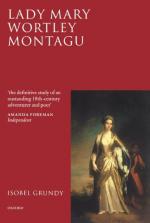|
This section contains 16,584 words (approx. 56 pages at 300 words per page) |

|
SOURCE: “The ‘Spectatress’: Satire and the Aristocrats,” in Lady Mary Wortley Montague and the Eighteenth-Century Familiar Letter, The University of Georgia Press, 1994, pp. 114-52.
In this essay, Lowenthal argues that in her letters concerning the English social elite Montagu “attempts to work through [the competing demands of class and gender … and to emphasize the impossibility of separating private from public behavior.”]
Upon her return to England, and without the “enlivening sun” of Constantinople, Lady Mary supplies her own brilliance in a series of satiric letters composed primarily during the 1720s and 1730s and sent to her sister and other aristocratic women friends. As in the Turkish Embassy Letters, she purports to be the detached observer of scenes before her: “As for my selfe, having nothing to say I say nothing. I insensibly dwindle into a Spectatress” (20 March 1725; 2:48).1 Yet her strategy in these letters is not to make the...
|
This section contains 16,584 words (approx. 56 pages at 300 words per page) |

|


